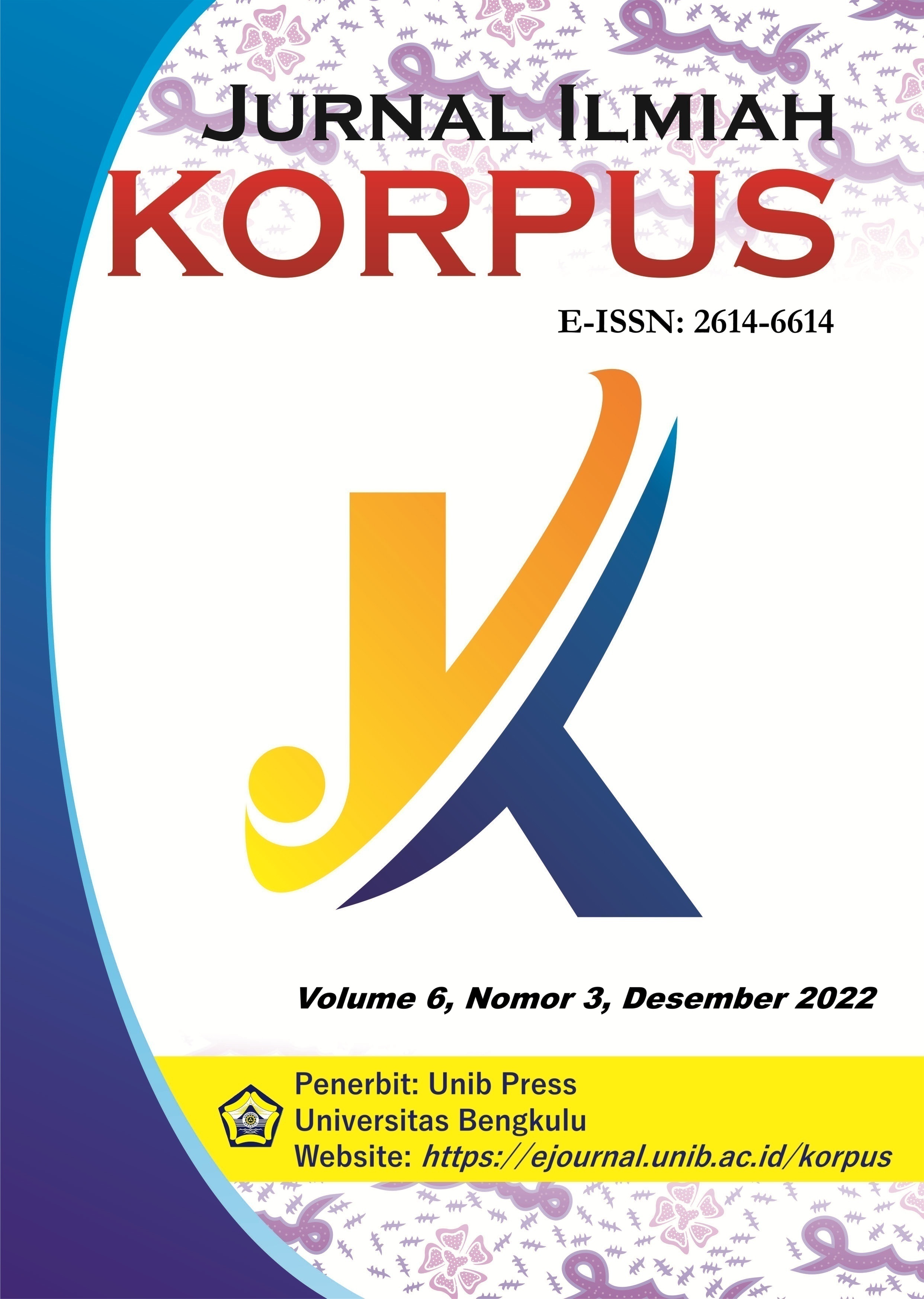Main Article Content
Abstract
The purpose of this study was to determine how the implementation of learning to write fantasy story texts was carried out. The method used in this study was a descriptive method with a qualitative approach. The population in this study were students of class VII G and class VIII H students of SMP N 2 Bengkulu City. The data collection techniques used observation and documentation techniques. The data analysis technique used in this study was to use qualitative data analysis. data, presentation of data and drawing conclusions. The results showed that the implementation of learning was carried out in two meetings with an allocation of 45 minutes, where in the first meeting the students observed a fantasy story text and the second meeting the students watched a fantasy story video. The implementation of learning is carried out in three stages of learning, namely preliminary activities, namely attracting the attention of students by greeting and greeting students, teachers checking student attendance, raising students' learning motivation, asking questions related to the material, which core activities are in the implementation of learning. writing fantasy story texts using a scientific approach which has several stages, namely observing fantasy story texts, collecting information from what is observed, processing information based on tasks given by the teacher and conclusions carried out by Indonesian language teachers and class VII students of SMP N 2 Bengkulu City, and activities Closing is done only by saying greetings due to time constraints. At the end of the lesson the teacher gives an assessment of the learning outcomes based on the assessment criteria contained in the lesson plan made by the teacher.
Article Details
Copyright (c) 2023 A’isyah Mutia Sandy, Agus Joko Purwadi, Arono

This work is licensed under a Creative Commons Attribution-ShareAlike 4.0 International License.
Authors who publish with this journal agree with the following terms:
- Authors retain copyright and grant the journal right of first publication with the work simultaneously licensed under a Creative Commons Attribution License that allows others to share the work with an acknowledgment of the work's authorship and initial publication in this journal.
- Authors are able to enter into separate, additional contractual arrangements for the non-exclusive distribution of the journal's published version of the work (e.g., post it to an institutional repository or publish it in a book), with an acknowledgment of its initial publication in this journal.
- Authors are permitted and encouraged to post their work online (e.g., in institutional repositories or on their website) prior to and during the submission process, as it can lead to productive exchanges, as well as earlier and greater citation of published work (See The Effect of Open Access).
- This work is licensed under a Creative Commons Attribution-ShareAlike 4.0 International License.
References
- Dalman. 2012. Keterampilan Menulis. Jakarta: Rajawali Pers.
- Fathurohman,Muhammad.2015. Model-modelPembelajaran Inovatif. Depok: AR-Ruzz Media.
- Kodir, Abdul. 2018. Manajmen Pembelajaran Saintifik Kurikulum 2013.Bandung: CV Pustaka.
- Moleong, Lexy J. 2007. Metodologi Penelitian Kualitatif. Edisi Revisi. Bandung : PT Remaja Rosdakarya.
- Mulyasa, Enco. 2007Standar Kompetensi dan Sertifikasi Guru. Bandung: PT. Remaja Rosdakarya.
- Nurgiyantoro, Burhan. 2008. Dasar-dasar Pengembangan Kurikulum Sekolah, Yogyakarta: BPFE Yogyakarta.
- Peraturan Mentri Pendidikan dan Kebudayaan RI No.22 Tahun 2016 tentang Standar Proses Pendidikan Dasar dan Menengah.
- Rusman. 2014. Model-Model Peembelajaran. Depok: PT Bumi Aksara.
- Sunardi, Imam Sujadi.2017. Sumber Belajar Calon peserta Program PLPG. Kementerian dan Kebudayaan Jenderal Guru dan Tenaga Pendidikan.
- Tarigan, Henry Guntur. 1986. Menulis Sebagai Suatu Keterampilan Berbahasa. Bandung: Angkasa.
- Umar & Syambasril. 2014. Program Pengalaman Lapangan-1. Fakultas Keguruan dan Ilmu Pendidikan Universitas Tanjungpura
References
Dalman. 2012. Keterampilan Menulis. Jakarta: Rajawali Pers.
Fathurohman,Muhammad.2015. Model-modelPembelajaran Inovatif. Depok: AR-Ruzz Media.
Kodir, Abdul. 2018. Manajmen Pembelajaran Saintifik Kurikulum 2013.Bandung: CV Pustaka.
Moleong, Lexy J. 2007. Metodologi Penelitian Kualitatif. Edisi Revisi. Bandung : PT Remaja Rosdakarya.
Mulyasa, Enco. 2007Standar Kompetensi dan Sertifikasi Guru. Bandung: PT. Remaja Rosdakarya.
Nurgiyantoro, Burhan. 2008. Dasar-dasar Pengembangan Kurikulum Sekolah, Yogyakarta: BPFE Yogyakarta.
Peraturan Mentri Pendidikan dan Kebudayaan RI No.22 Tahun 2016 tentang Standar Proses Pendidikan Dasar dan Menengah.
Rusman. 2014. Model-Model Peembelajaran. Depok: PT Bumi Aksara.
Sunardi, Imam Sujadi.2017. Sumber Belajar Calon peserta Program PLPG. Kementerian dan Kebudayaan Jenderal Guru dan Tenaga Pendidikan.
Tarigan, Henry Guntur. 1986. Menulis Sebagai Suatu Keterampilan Berbahasa. Bandung: Angkasa.
Umar & Syambasril. 2014. Program Pengalaman Lapangan-1. Fakultas Keguruan dan Ilmu Pendidikan Universitas Tanjungpura
